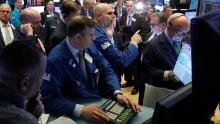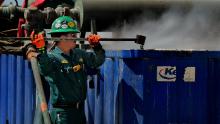Premarket stocks: Why this market shock is not like 2008
Fears that the coronavirus pandemic will tip the world into recession and a price war over oil sent stocks plunging on Monday, temporarily halting trading in the United States amid the worst market rout in more than a decade.
“This was truly a historic session,” Bespoke Investment Group told clients. “Barring the financial crisis, these sorts of swings haven’t happened in the past 30 years.”
Markets are moving back up on Tuesday as some investors dip their toes back in. S&P 500 futures are up 4.4%. Gains in Asia and Europe were more tepid. Hong Kong’s Hang Seng finished 1.4% higher, while the FTSE 100 climbed 3.6% in London.
But investors still want to know: Is this a repeat of the 2008 financial crisis?
The BlackRock Investment Institute acknowledged Monday that the scale of market moves have been “reminiscent” of 2008. But the asset manager sees fundamental differences.
“The economy is on more solid footing and, importantly, the financial system is much more robust than it was going into the crisis of 2008,” BlackRock said in a note to clients.
Wall Street has been quick to note that banks are better capitalized this time around due to new regulations, and that debt levels, while high, are concentrated in less risky areas. Corporate debt, particularly in the energy sector, could pose a problem, but doesn’t look “large enough (yet) to trigger a global crisis,” Neil Shearing, group chief economist at Capital Economics, said Monday.
This should allow for a faster economic rebound after the coronvirus is brought under control. “Fear can take [the market] lower, but expect [a] quick recovery when health threat recedes,” former Goldman Sachs CEO Lloyd Blankfein tweeted Monday. “Unlike ’08, will avoid systemic damage.”
Central banks, meanwhile, have far less ammunition at their disposal, with interest rates already at or near historic lows. And there are concerns that monetary policy remedies take time to flow through the system.
Could coronavirus shut Wall Street? Banks move staff out
US stock markets were halted briefly Monday as a record fall in oil prices and fears of the coronavirus triggered panic selling. But the epidemic poses a much bigger logistical headache for Wall Street: how to keep trading going if banks have to evacuate their offices to fight the spread of the illness.
Why it matters: It’s the biggest logistical challenge for the finance industry since Hurricane Sandy in October 2012, and before that, the terrorist attacks on September 11, 2001. And it comes while banks are dealing with a global stock market rout and major volatility.
Low oil prices could damage the US economy
If oil prices remain at low levels, it could shave up to 0.35 percentage points off US GDP in the first quarter, according to Morgan Stanley. The investment bank is also concerned that consumers won’t spend any of their savings from lower gas prices. If people aren’t traveling, airlines may not get a boost, either.
Lower oil prices are also “small comfort” to China, the world’s largest oil importer, Julian Evans-Pritchard, senior China economist at Capital Economics, told clients Tuesday. “The boost to growth will be modest and won’t make up for the hit to Chinese exports from weaker global demand,” he said.
Up next
Coming up: President Donald Trump has invited bank CEOs to the White House for a meeting on the coronavirus outbreak.


